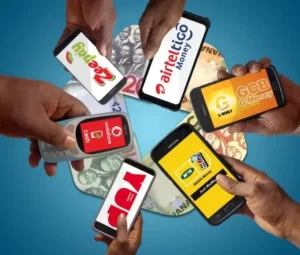Philip TAKYI (Dr)
This article seeks to examine cybercrime in the context of digital finance in Ghana, particularly using mobile money, and providing valuable insights into the challenges and strategies needed to ensure a secure financial ecosystem.
The stability of the financial system is directly linked to the security of digital finance. Cybersecurity breaches, if not effectively managed, can undermine trust in financial institutions and disrupt the overall stability of the emerging digital financial ecosystem in Ghana.

Individuals and businesses using digital financial services entrust their assets and sensitive information to these platforms. Cybersecurity measures are therefore essential to protect customers from financial loss, identity theft, and other fraudulent activities.
Ghana, like many developing economies, has been actively working towards financial inclusion. Mobile money plays a crucial role in reaching the unbanked and underbanked populations. Cybersecurity concerns, therefore, if unaddressed, could hinder efforts to expand the formal financial system.
Financial Technology in review
Fintech, as you may be aware of, abbreviated for financial technology, refers to the use of technology to improve and automate traditional financial services and processes. The ecosystem includes a variety of products and services such as online banking, mobile payments, peer-to-peer lending, digital wallets, and financial management tools.
Earlier attempts by traditional banks and the government of Ghana to include many financially through ICT infrastructure investments had failed because of issues of scalability (Haruna, 2012). Consequently, overcoming this challenge was crucial for the next innovation in the financial landscape.
MTN Ghana achieved this feat through mobile phones. Although ICT had been introduced in the banking landscape of Ghana years earlier, the real financial technology era, as I may call it, began in 2009, with the introduction of mobile money.
In an attempt to define the FinTech ecosystem in Ghana, there are five markets in the Fintech space in Ghana made up of digital payments, digital investments, digital capital raising, digital assets, and neo banking (including mobile money). Fintech companies often use advanced technologies such as artificial intelligence and blockchain to create new financial products and services that are more efficient, accessible, and user-friendly than traditional financial institutions.
FinTech through ICT infrastructure had become the answer to reducing the financial exclusion gap in Ghana. Consequently, aside from the other players, government regulations had become a necessary piece of this jigsaw puzzle. The current regulations instituted by the government provide a fair playing field for all FinTech players (Shim and Shin, 2016; Lee and Shin, 2018).
The growth in the fintech market is driven by several factors. Firstly, the increasing adoption of smartphones and the internet as earlier indicated has made digital solutions more accessible to consumers, leading to a surge in demand for fintech services.
Secondly, the COVID-19 pandemic has accelerated the shift towards digital payments and investments, as consumers have had to adapt to remote and contactless transactions. Coupled with that, regulatory changes have enabled fintech companies to compete with traditional financial institutions on a more level playing field, and finally, advancements in technology, such as AI and blockchain, have opened new possibilities for fintech innovation, driving further growth in the market.
The Mobile Money perspective
Ghana has experienced significant growth in mobile money services over the years, with widespread adoption among the population. Mobile money platforms such as MTN Mobile Money, Vodafone Cash, and AirtelTigo Money play a crucial role in financial inclusion. Mobile money was first launched in Ghana in 2009 by MTN. Uptake has increased quickly since then, and by March 2019 there were 12.7 million active mobile money accounts in existed Ghana. Mobile money has become very popular as people do not want to make long queues in the bank to withdraw money from banks.
Total mobile money transactions for the first four months of 2023 surpassed ¢550 billion, about 66.2% year-on-year growth, data from the Bank of Ghana has revealed. This is compared with ¢331.2 billion recorded during the same period in 2022. The total mobile money transactions for 2023 is expected to exceed ¢1 trillion.
According to the May 2022 Summary of Economic and Financial Data by the Bank of Ghana, Mobile Money transactions in January 2023 were estimated at ¢130.1 billion, compared with ¢76.2 billion during the same period in 2022. It surged to ¢134.0 billion in February 2023 (February 2022: ¢76.5 billion) and subsequently to ¢147.5 billion in March 2023 (March 2022: ¢90.5 billion). It however fell to ¢138.8 billion in April 2023 (¢87.7 billion).
A network of mobile money agents has been established across the country, allowing users to deposit and withdraw cash, pay bills, and transfer money easily. This physical presence enhances the accessibility of mobile money services. Notwithstanding its issues, the Ghanaian government has recognized the importance of mobile money in advancing financial inclusion and has supported initiatives to promote its usage.
The Bank of Ghana’s (BOG) fraud statistics for 2021 indicated an alarming rate for cyber fraud. A total of GHC 114M is reported to be involved in fraud cases in the country. Out of this, 45.61% was recovered and the rest lost to fraud.
According to “The Race to Adopt”, an annual global security report, the financial sector continues to be targeted by financially motivated organized crime, which often takes the form of data breaches, identity-based threats – malware, Ransomware, phishing, and social engineering attacks – and hacking, using stolen credentials.
With the dominance of mobile money, there is a corresponding increase in digital transactions. This makes the sector an attractive target for cybercriminals seeking to exploit vulnerabilities and gain unauthorized access to funds or sensitive information.
Cyber threats such as phishing attacks and social engineering attempts may target mobile money users. Criminals often attempt to trick individuals into revealing personal information or mobile money PINs (Personal Identification Numbers) through deceptive means.
User awareness and education programs may have been implemented to educate mobile money users about cybersecurity best practices, including safeguarding their PINs, recognizing phishing attempts, and using secure devices.
Mobile money providers invest in secure technology infrastructure, including encryption protocols, secure servers, and robust mobile applications, to protect customer data and transactions, these may require further studies to corroborate.
Conclusion
In summary, the importance of addressing cybercrime in the mobile money ecosystem in Ghana is rooted in safeguarding the financial well-being of individuals and businesses, promoting economic development, and maintaining trust and confidence in that sector. It requires a coordinated effort from government agencies, financial institutions, and other stakeholders to establish and maintain a resilient and secure digital finance ecosystem.
To address these cybercrimes, mobile money companies in Ghana need to prioritize robust cybersecurity measures; regularly update their security protocols; educate users on best practices; and collaborate with regulatory bodies to ensure compliance with industry standards.
Cybersecurity should be an integral part of fintech innovation to build trust and maintain the integrity of the financial services offered. Additionally, establishing effective incident response and recovery plans is essential. Financial institutions should be prepared to respond promptly to any cybersecurity incidents, mitigate damage, and recover systems to ensure minimal disruption to financial services.
The Ghanaian government has shown interest in promoting digital finance and financial inclusion. Policies and initiatives may include efforts to enhance regulatory frameworks, infrastructure development, and digital literacy programs.
The regulatory environment for digital finance has likely continued to evolve, with authorities working to strike a balance between fostering innovation and ensuring consumer protection. Regulatory measures may include licensing requirements for fintech companies and guidelines for secure digital transactions.
Finally, global trends in financial technology, such as the rise of decentralized finance (DeFi), artificial intelligence (AI) applications, and blockchain, may have influenced the digital finance landscape in Ghana.
Collaborations with international organizations and financial institutions to leverage global best practices, share experiences, and attract investments in the digital finance sector to ensure confidentiality, integrity and guaranteed availability of data on the mobile money platforms.
References
Digital Finance Report 2020. Bank of Ghana. https://www.bankofghana.gov.gh/
Doe, J. (2019, July 15). Strategies for Achieving Financial Security. Invest Smart.
Haruna, A. (2012). Title of the Cybersecurity Article. Journal of Cybersecurity, 7(3),
123-145.
Johnson, M. B. (2016). Enhancing Financial Security: A Comprehensive Approach.
Journal of Finance, 28(4), 123-145.
Lee, K., & Shin, D. (2018). Emerging Trends in Cybersecurity Practices. Cybersecurity
Journal, 22(1), 89-102.
Shim, J., & Shin, D. (2016). Cybersecurity Challenges in the Digital Age. Journal of
Cybersecurity, 14(3), 45-67.
Smith, J. A. (2018). Financial Security in the Modern World. ABC Publishers.
World Bank. (2020). Financial Security in Developing Countries: A Comprehensive
Report.










